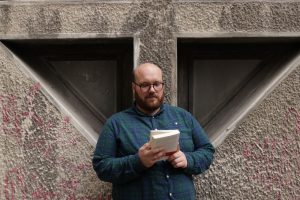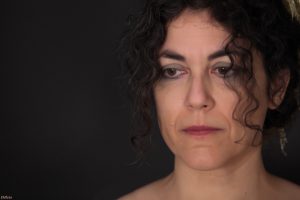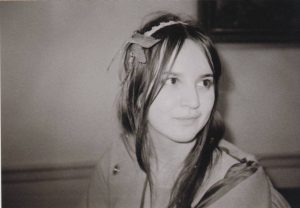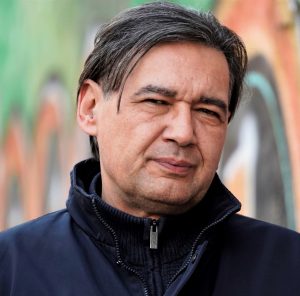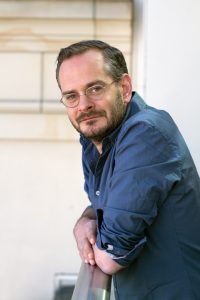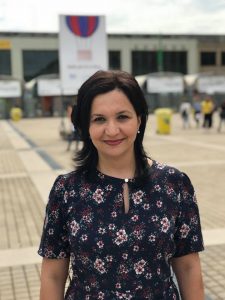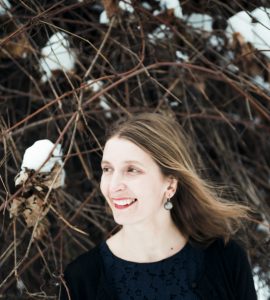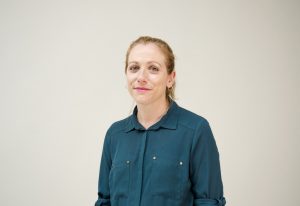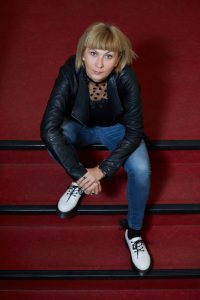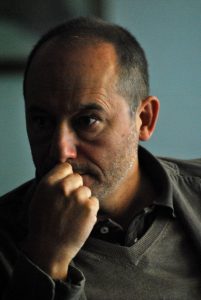Foreign guests at Vilenica 2019
Petar Andonovski, North Macedonia
Petar Andonovski (1987), one of the most important Macedonian writers of his generation, has published a poetry collection Ментален простор (Mental Space, 2008), as well as the novels Очи со боја на чевли (Eyes the Colour of Shoes, 2013), Телото во кое треба да се живее (The Body One Has to Live In, 2015), and Страв од варвари (Fear of Barbarians, 2018). His first novel was shortlisted for the European Union Prize for Literature and for the Macedonian Novel of the Year Award. He won the latter for his second novel in 2015.
Ayesha Chatterjee, Canada
Ayesha Chatterjee (1968) was born and raised in India. She has lived in England, the USA and Germany and now calls Toronto home. She has a BA in English literature and German studies from Smith College in Massachusetts, and is past president of the League of Canadian Poets. Chatterjee has published two poetry collections: The Clarity of Distance (2011) and Bottles and Bones (2017). She has read her work in Canada, Germany and India, and been published across the globe.
Maria Grazia Calandrone, Italy
Maria Grazia Calandrone (1964) is a poet, a writer, a playwright and a journalist. She works in the cultural department of radio RAI 3, writes literary reviews, and also runs poetry workshops at primary schools, prisons, and psychiatric hospitals. Her last poetry collection Giardino della gioia (The Garden of Joy) came out this year. Her work has been translated into more than twenty languages; a collection of her poetry came out in Arabic, while the collection Serie fossile (2015; Fossils) was published in English and in Catalan.
Claudio Damiani, Italy
Claudio Damiani (1957) has published nine poetry collections and almost all of them were awarded. The last one, Cieli celesti (Heavenly heaven), came out in 2016. Damiani’s poetry, inspired by ancient Latin poets and by the Italian Renaissance, is written in a simple language that puts emotions in the foreground. In 2016, he published the essay collection La difficile facilità. Appunti per un laboratorio di poesia (Difficult ease. Notes on a Poetry Workshop). He is also the co-editor of the Roman literary magazine Viva.
Maria Paula Erizanu, Moldova
Maria Paula Erizanu (1992) was born in Moldova, but now she lives in London, where she also finished her MA in journalism. Besides fiction, she also writes for prominent international media. Her first book, This Is My Revolution. Steal It. (2010), received a lot of attention and several awards; it depicts the opposition protests in Moldova in 2009. It was followed by the poetry collection Ai grijă de tine (Take Care, 2015). She is currently writing a history novel Ard pădurile (The Woods are Burning), for which she was awarded the CEI Fellowship in 2018.
Zvonko Karanović, Serbia
Zvonko Karanović (1959) has a status of a cult underground poet in his homeland. He writes poetry and novels, his works display influences of beatniks, film and pop culture. His best-known work is the trilogy Dnevnik dezertera (The Diary of Deserters), which chronicles the turbulent 1990s in Serbia. In recent years he has dedicated his time to poetry. His latest prose poetry collection is Iza zapaljene šume (Beyond the Burning Forest, 2018). He has been translated into several foreign languages; a selection of his poetry was published also in the USA.
Enes Karić, Bosnia and Herzegovina
Enes Karić (1958) is a writer and full professor of Qur’anic Studies at the Faculty of Islamic Studies in Sarajevo. He graduated from Islamic Studies and Political Science. He earned his PhD at the Faculty of Philology in Belgrade. He augmented his specialisation in Arabic and Religious Studies at Yale, Oxford and Al-Azhar University. Karić translated Qur’an into Bosnian. He writes scholarly studies, essays and fiction. His most recent novel, Boje višnje (The Colours of Sour Cherry, 2016), is a chronicle of the author’s home village Višnjevo.
Jonas Lüscher, Switzerland
Jonas Lüscher (1976) is the author of a novella, Frühling der Barbaren (2013; Barbarian Spring, 2014), in which he treats the financial crisis with irony and an abundance of black humour, and of a novel, Kraft (2017), in which his satire is pointed against neo-liberalism. He also writes in-depth articles on current social problems (immigration, digitalisation, etc.). Both novels were nominated for the Swiss Book Prize and the German Book Prize. Kraft won the Swiss Book Prize. They have been translated into several language and adapted for the stage.
Amanda Michalopoulou, Greece
Amanda Michalopoulou (1966) is one of the most prominent Greek writers. She writes novels, short stories, children’s books, and essays, and she also teaches creative writing. She has received several awards for her works, among others the award of Academy of Athens (the most distinguished Greek literary prize) for her short story collection Λαμπερή μέρα (Bright Day, 2013). Her works have been translated into twenty languages, including English, German, Slovenian, and Spanish. Her latest work is the auto-fiction Μπαρόκ (Baroque, 2018).
Manjola Nasi, Albania
Manjola Nasi (1982) graduated in English and she later wrote a PhD thesis on T. S. Eliot’s poetry. She writes poetry, translates from English and lectures at the Faculty of Foreign Languages in Tirana. She has published two poetry collections: Soneti i vjeshtës (Sonnets of Autumn, 2002) and Një udhëtim e gjysmë (A Journey and a Half, 2018). She has received several awards for her poetry, among others also an award of the Albanian Ministry of Culture. She has been invited to several international book fairs and her poems have been translated into many languages.
Sverrir Norland, Iceland
Sverrir Norland (1986) has an MA in Creative Writing from Middlesex University London. He has written two novels: Kvíðasnillingarnir (Masters of Anxiety, 2014), in which he tackles contemporary Icelandic society, and Fyrir allra augum (In Plain Sight, 2016). He also writes short stories and poems, inspired by contemporary society. Last year, he founded a small publishing house in Reykjavik, dubbed AM forlag, and he also publishes an online book newsletter Leslistinn. He will be at the Vilenica Festival as an Emerging Writer on Tour.
Carolina Pihelgas, Estonia
Carolina Pihelgas (1986) studied Anthropology of Religion at the University of Tartu. She is the author of several collections, these of which, the prose poetry collection Valgus kivi sees (The Light Within the Stone), was published this year. Her dense and metaphorical poetry often explores mythological themes, nostalgia for lost worlds, or memories. In 2012 she received the Gustav Suits poetry award. She is also the editor of the literary magazine Värske Rõhk that focuses on young authors. She has translated many world renowned poets (Sappho, Neruda, Plath, etc.).
Elizabeth Reapy, Ireland
Elizabeth (E. M.) Reapy (1984) has an MA in Creative Writing from Queen’s University in Belfast. Her debut novel Red Dirt (2016) is about three young Irish people who travel to Australia during the financial crisis to find work and to start anew. It won the Newcomer of the Year award in 2016 and the 2017 Irish Rooney Prize. This year her second novel Skin appeared, which is about a young woman called Natalie who is unhappy in her skin and unhappy with her professional and private life, so she travels the world trying to find herself again.
Ivana Šojat, Croatia
Ivana Šojat (1971) writes novels, short stories, poetry, children’s stories and essays. Her most recent work is the novel Ezan (2019). In the past she worked as a correspondent from Brussels, a translator, and today she writes columns for Večernji list newspaper. She has received all prominent Croatian awards for her works, and some of those works have also been adapted for the stage and received awards as well. In 2016 she was awarded the Croatian Order of Danica – Marko Marulić for her oeuvre and promotion of Croatian culture at home and abroad.
Gian Mario Villalta, Italy
Gian Mario Villalta (1959) graduated from contemporary literature at the University of Bologna. He is a high school teacher and since 2003 he has also been the artistic director of the literary festival Pordenonelegge. He writes poetry (the collection Vanità della mente (Vanity of Reason, 2011), prose fiction (the novel Satyricon 2.0, 2014), plays, literary studies and reviews. He writes poetry in Venetian dialect as well as in literary language. For him, exploring the language of poetry is always also connected to exploring his own identity and sense of belonging.

